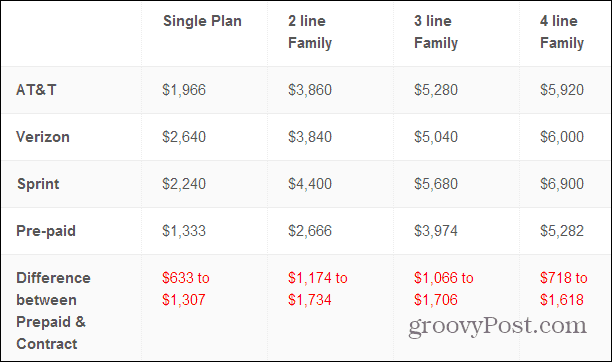In the US, consumers seem to be attracted to getting shiny new devices on the cheap or even free. Even if it ends up costing a lot more over time. But that trend could be changing. T-mobile is championing the idea of prepaid mobile devices and service. In fact, a lot of prepaid services like T-mobile, Ting, and others allow you to bring your own device. There’s no outrageous early termination fees, and the monthly pricing is a lot more straight-forward too. Check out our article on how much money you can save by switching to a prepaid plan. You might be surprised to learn you could end up saving from $600 per year for a individual plan, to upwards of $1,500 for a family.
What’s your take? Would you consider switching to a prepaid plan after your two-year contract is up? As Austin wrote in his full write-up, there really are no disadvantages plus you get unlimited data and… it’s less expensive. :) Downside? It’s crazy to think about the amount of money that’s saved. But people look at the upfront price. iPhone 5 $45! So that’s an impulse buy right? Then the afterthought is the two-year contract, hidden fees, early termination fees, data throttling…etc. Not to mention the annoying Credit Check that is done just to qualify for the scam contract. In today’s economy … Rural CT is out of T-Mob coverage area but T-Mob partners w/ATT which serves our hilly neck of the woods. As I travel from town to town here it switches from one to the other quite seamlessly (with some exceptions). I suppose that would be problematic if you needed to use extensive data MB’s while “roaming” but my Phone is primarily used just as a “hand terminal” to test my websites’ functioning on smartphones and it lives on wi-fi 90% of the time. However, I need to keep my antique flipphone Verizon prepaid functioning ($15 a month), for emergency road calls, since ATT’s coverage here in the hills is spotty, but I refused to enter into a contract with either of those bandits just to get an iPhone, so I had waited a very long time to confirm that my sites’ code DID work well on mobile devices. Of course every person’s situation is different and needs vary, but I don’t need a ton of computing power on the go, so having the latest greatest smartphone isn’t as important for me. Since I work out of my home office, having powerful computing power here is more important than on the go. As long as I can get data and the occasional phone call, I am good. Even if I did want the latest and greatest device, I mean, you can get them from prepaid services … T-Mobile has the iPhone 5 and Samsung Galaxy S4 on T-Mobile or I can get an unlocked phone and bring it over to virtually whatever provider I want. Yes, it costs more to buy the device upfront, but the money you save over time is insane. Not to mention how easy billing is. For instance right now I have an LG Android 2.3.7 smartphone with Virgin Mobile and I pay $35 a month for unlimited everything. and that is honestly more than I need anyway … I can do what I need over WiFi 80% of the time anyway. Those are just a few reasons I am perfectly happy with prepaid service and advocate it to my friends and family. They used to have T-Mobile and AT&T as their providers, but AT&T is not currently available (unlss you already bought the AT&T sim card, before they were discontinued). Now you can only get T-Mobile coverage with Straight Talk. I have used them for months, with no hitches (average data user, heavy phone user). I guess for what I need, it fits perfectly for my data use and I rarely talk anyway. Straight Talk is only T-mobile coverage now with a new phone huh? I was actually thinking about switching to Windows Phone 8 with them, but T-mobile coverage out here in the sticks is sketchy at best. Verizon is solid though. They are an MVNO reseller for all these companies (T-Mobile, AT&T, etc), so they don’t have their own towers. See this link for more info: http://straighttalkbyop.com/ (also, http://www.straighttalk.com). I do enjoy the savings! I will never use a regular contract cell service again. But I definitely agree – prepaid, with your own device, is the only financially astute way to go. Then I switched to Airvoice Wireless, which runs on AT&T’s network so I’m comparing apples to apples again. Only now I pay 4 cents per minute, 2 cents per txt, and if enable data it’s 33 cents/mb. (But it’s rare I need it – wifi is often readily available). I’ll probably never buy a phone with a 2-year contract again. It seems you pay for it twice. The only downside is that most prepaid carriers don’t have access to ancillary roaming partners. So a Sprint MVNO (for example), or their own prepaid brands (Virgin and Boost), don’t have access to roaming partners (ex. Verizon) when out of Sprint coverage. Depending on where you live, work, and play, that may or may not be an issue for you. Coverage these days is so good, that unless you’re in a fringe area, it really shouldn’t be a problem. In addition, prepaid providers are getting more sophisticated with their roaming agreements. Postpaid is on a slow decline; expect that decline to accelerate in the next few years! Comment Name * Email *
Δ Save my name and email and send me emails as new comments are made to this post.


